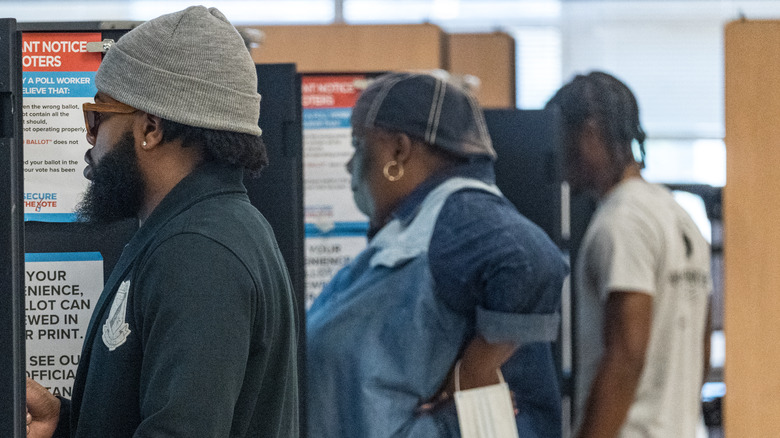What Is A Runoff Election And Why Do They Happen?
The closely watched 2022 Georgia midterm election between Sen. Raphael Warnock and Republican nominee Herschel Walker will head to a runoff election. The results of that Georgia runoff (on December 6, per "PBS NewsHour") could decide the balance of power in the United States Senate, The Associated Press reports. Not every state has runoff elections as part of their electoral process like Georgia, and according to Ballotpedia, the states that do have runoff elections handle the process differently.
In certain states, the potential for a runoff depends on the nature of the election itself, and the elected position that will be decided by the outcome, such as if the office in question is in the state or in the federal government, like what's set to take place in Georgia between Warnock and Walker. More than anything though, runoff elections happen in certain states and not in others because each state defines what it means to win an election, and each has its own estimation of just how many votes it takes for the voice of the people to be heard sufficiently.
Most states have no runoff elections at all
As Ballotpedia notes, all but 10 U.S. states have no runoff election system. That's because those states in question use what's called a plurality voting system. As the online political encyclopedia elsewhere explains, a plurality voting system — sometimes called winner-take-all — means that if no single candidate wins 50% + 1 of all votes in the election, then the candidate who got the most votes will win, regardless of how big the field of candidates may be.
In states like these, the issue between Sen. Raphael Warnock and Herschel Walker would be moot, and the candidate who got the most votes at the time of the election would win the right to serve in the U.S. Senate for Georgia. According to Ballotpedia, all but two U.S. states — Georgia and Louisiana — use the plurality system in their general elections, while 10 others only have runoff elections in their primaries. South Dakota will only hold a runoff election in their primaries for congressional seats and for state governor. Meanwhile, Vermont will have a runoff in its state primary only if the vote is tied.
Only Georgia and Louisiana have runoffs in their general elections
Per Ballotpedia, Louisiana and Georgia are the only two states in the U.S. to require a runoff in their general election if any one candidate fails to earn the majority of the vote, which is 50% of all votes plus 1. Neither Sen. Raphael Warnock nor Herschel Walker reached that threshold, with Warnock receiving over 49% of the vote and Walker over 48% (via The New York Times).
In the last election cycle, Warnock defeated Republican interim Sen. Kelly Loeffler to win his seat. Also notable, Georgia candidates may, by law, request a recount if the margin of victory is 0.5% or less, though there's no legal mechanism in place to trigger a recount automatically, according to ABC News.
One purpose of a runoff election in any scenario, per the National Conference of State Legislatures, is to encourage a candidate to appeal to a majority of voters and not just their own supporters or the ideological extremes of their party.


